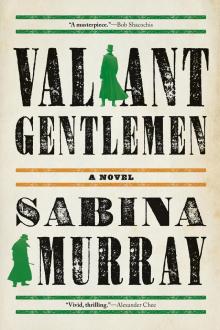- Home
- Sabina Murray
Valiant Gentlemen
Valiant Gentlemen Read online
VALIANT
GENTLEMEN
ALSO BY SABINA MURRAY
Tales of the New World
Forgery
A Carnivore’s Inquiry
The Caprices
Slow Burn
VALIANT
GENTLEMEN
SABINA
MURRAY
Grove Press
New York
Copyright © 2016 by Sabina Murray
Map copyright © 2007 by Reginald Piggott taken from Jeal, Tim, Stanley.
New Haven: Yale University Press, 2007.
All rights reserved. No part of this book may be reproduced in any form or by any electronic or mechanical means, including information storage and retrieval systems, without permission in writing from the publisher, except by a reviewer, who may quote brief passages in a review. Scanning, uploading, and electronic distribution of this book or the facilitation of such without the permission of the publisher is prohibited. Please purchase only authorized electronic editions, and do not participate in or encourage electronic piracy of copyrighted materials. Your support of the author’s rights is appreciated. Any member of educational institutions wishing to photocopy part or all of the work for classroom use, or anthology, should send inquiries to Grove Atlantic, 154 West 14th Street, New York, NY 10011 or [email protected].
First published by Grove Atlantic, November 2016
Published simultaneously in Canada
Printed in the United States of America
ISBN 978-0-8021-2545-3
eISBN 978-0-8021-8970-7
Grove Press
an imprint of Grove Atlantic
154 West 14th Street
New York, NY 10011
Distributed by Publishers Group West
groveatlantic.com
For Esmond
PART ONE
I
Matadi
September 1886
The first time Casement sees him, Ward is turned away, working on a sketch. He’s in a white shirt and the sleeves are rolled to the elbows, showing strong forearms darkened with exposure to the sun. The stance is perfect contrapposto, the hips angled, the right foot casually set forward. As if sensing Casement’s gaze, Ward turns and smiles. It is a romantic image that Casement has played over in his mind: first, the sight of the shoulders, the sun hitting the fair hair, the subtle movement of the arms, the hands, Ward’s attention drawn to some compelling subject.
“That’s ridiculous,” says Ward. “The first time we met was in an office. I was waiting for you to show up so that we could share the transport to Vivi. We shook hands. In fact, I think I saw you before you saw me.”
“How can you be so sure?”
“Well, for one thing, I wouldn’t be standing in the sun without my hat.”
“I remember the absence of the hat because it was exceptional.”
“Also,” adds Ward, “you can’t see my forearms from behind, not if I’m sketching. My left hand is holding the book and I’ve got the pen in my right. From where you were standing”—Ward presents his back to illustrate—“my arms are completely blocked by my torso. If you were an artist, you would know this.” Ward turns again to Casement and shakes his head. He’s wondering why Casement would find the need to create such a scenario. “That’s the problem with you, Casement. You’re a romantic, always making things up.”
“One of many, I’m sure.”
Casement grabs Ward’s sketchbook and flips through to an illustration of a mad bull elephant with a flailing native raised high in the beast’s trunk: Elephant and native lock eyes. Casement holds the illustration to Ward as evidence.
“Might happen. An elephant could get a native like this, and this is what it would look like,” says Ward. “But bodies don’t lie. You could never see my forearms from behind if I were sketching.”
Casement and Ward are company men, once employees of the International Association of the Congo, now members of the Sanford Exploring Expedition. Both are relieved to no longer be employed by King Leopold of Belgium, but the complications of working for England in this Congo Free State—a plot marked out as one might a flower bed—now under Belgian rule, are many. Casement and Ward have both run stores, but transportation is where skilled people are really needed. On the lower Congo, there are no roads, no rails nor navigable waterways that can accommodate more than a dugout canoe. Therefore, the only method of bringing things in (brass rods, cloth) and things out (ivory, rubber) is to engage porters. And one needs a lot of porters.
For sure, there are some Zanzibaris, people who showed up with the explorer Henry Morton Stanley and couldn’t find their way home, but the majority must be gathered from the local villages. And none of them are eager to leave their homes, wives, children, and fields. Also, the regulation load is an impressive sixty-five pounds. This the porters carry into the unfamiliar interior, where there are all manner of snakes and enemies, tribesmen who would rather eat you than call you brother.
“Looks like rain,” says Ward. Casement looks up at the sky. It does look like rain. “Actually it looks like deluge. Can one say that?”
“Ward, you can say whatever you want. This is Africa.”
Ward has engaged a young boy to carry some of his things and to gather firewood and cook. The boy is carrying sketchbooks and pens, also Ward’s razor, shaving brush, needle and thread, and extra cartridges, though Ward carries his own rifle and it is loaded.
Casement travels with his dog that he has named Tom, after a dog back in Ballycastle, who was probably named after a person.
In Kikongo, Casement asks the boy, “What is your name?”
“You know me, Mayala Swami,” says the boy, using Casement’s nickname. “I am Mbatchi, son to Luemba.”
“Yes,” says Casement, “now I can see it.”
Usually it is Casement traveling alone, or Ward traveling alone, the other white man needed to stay in camp, a civilizing presence in the village as on a map a pushpin signifies rule. But with the shipment of the Florida—a paddle steamer—has come a hoard of Belgians and Englishmen, so Casement and Ward can travel together and as twice the normal number of porters is going to be needed to bear the Florida’s tons of metal to the edge of Stanley Pool, perhaps twice the normal number of porter procurers is justified. Casement wonders how many porters are left in the Bakongo villages in the immediate surroundings. How far will he and Ward have to go to meet the quota?
Down the gentle slope he sees his camp demarcated in thatched fencing, a square ensnaring the regular shapes of huts, a large barracks, white men in white clothing, black men in black skin. He thinks his heart is ensnared—fenced in like that, and dismisses the thought. There might be poetry in that, but none he’ll write.
“Come on, Casement,” says Ward. “I’d like to get ahead of that rain.”
It is a narrow path, single file, and breaks into a wall of greenery. Down that path the birds call to each other in undecipherable phrasing. The air is heavy with moisture. Down that path exists an eternity of savages and savage custom. Behind him the sun beats down on the present. Ward picks up the pace and soon will no doubt start whistling something, an absurd folk song that he learned in Australia or, more likely, some shearing ballad from his time in New Zealand. He’ll break into song. Ward loves to sing, although Casement has the better voice.
“You’re dawdling,” says Ward.
“What’s the hurry?”
“Oh, I don’t know.” Ward is hoping for some hunting.
The rain, miraculously, holds off. The dog sniffs with focus, halts, then plunges off the path and into the jungl
e. There is a fierce rustling, then silence. One hopes poor Tom won’t be gutted by a boar. Little Mbatchi looks around for an explanation.
“Think he’s coming back?” says Ward.
“Of course,” says Casement.
“What’s the word for ‘dog’ in Kikongo?” asks Ward.
“You are going to make a joke.”
“Is it mbwa?”
“That’s Swahili.”
“I’ll think of it,” says Ward.
And he will. Ward is certainly proficient in the Kikongo of the lower Congo, and the Kibangi of the upper Congo. He is learning Swahili and has some knowledge of Kibabatu. Ward is proficient in turning one word into another. His vocabulary is enormous, but the words do not always add up. Ward manages to spin sentence after sentence without ever really speaking the language.
First the dog returns and then a dense rain moves over them. Mbatchi slips in the mud and is very nervous that something in his bag has broken, but on inspection, all is still intact and he smiles and his smile is radiant, and then there’s lunch: yam, mandioca, dried fish. That’s the eight hours done with and now they should be close to the village. Casement likes this walking—it reminds him of his early years in Ballycastle where there was little to do but walk. It was a childhood split between the lush green of the Antrim countryside and the rattling commerce of his cousins in Liverpool. Then, he had thought Liverpool and Ballycastle opposites, but here, in the Congo, this feels like an opposite.
“Ward,” says Casement. “Can there be three opposites?”
Ward responds with a dramatic sigh. He stands, shaking his head.
“Ward,” says Casement, coming to stand beside him. He was going to ask what was wrong, but now he sees. The Bakongo village has been deserted. A goat reveals itself from the far side of a hut. Ward is down on one knee studying the ground. He picks something up.
“Casings,” says Ward.
“Arab?”
“It would seem.”
“Well,” says Casement. “Let’s hope our friends got away.”
Just two weeks ago there had been a decent field of sorghum, but someone has harvested it all and the rich empty dirt looks like a fresh grave plot. Arab slavers normally stayed north of the river, but the Belgians too need labor and ultimately the difference between the Belgians and the Arabs is a matter of brass rods and the possibility of returning home. Better that Casement hires these natives for the English, who will at least pay them for their labor and treat them well, and with kindness, as these dark cousins ought to be treated. Mbatchi has found rope to tie up the goat and is leading it around.
“Mayala Swami, can I keep it?”
“It’s yours,” says Casement.
“That could have fed us,” says Ward.
“Carrying meat through the jungle has never been a favorite activity of mine,” says Casement. This is a reference to leopards.
“Even alive,” Ward counters, “it’s still meat.”
Mbatchi is tying the goat to a tree and the goat seems relieved of the burden of freedom.
“I’ve never understood why they call you that,” says Ward.
“What? Mayala Swami?”
“Doesn’t that mean ‘ladies’ man’?”
“Yes. That’s a reasonably close translation to the Kikongo.”
“But you aren’t a ladies’ man, Casement. As far as I know, you’re a perfect gentleman.” There’s the edge of disdain in Ward’s voice.
Casement smiles, looking at the ground. “How would you, Mayala Mbemba, understand?” Mayala Mbemba is Ward’s nickname. It means “wings of an eagle” and refers to the fact that Ward managed to walk forty miles in one day. Ward is very proud of this nickname and calls attention to it and explains it to anyone who will hear him.
“Do I detect envy, Casement?”
“Without doubt.” Casement fixes his gaze to the left and then the right. “We should eat.”
Mbatchi has collected a good pile of firewood. Because of the rain, it will not burn easily, but should get them through the night. Mbatchi is terrified of leopards and as one rather large print revealed itself at the edge of the stream when he was collecting water, his concern is justified.
“I’d love to bag a leopard,” says Ward.
“It wouldn’t be the first time,” says Casement. “And we’re not here to hunt. We’re already a day behind and who knows where else the Arabs have been.”
Ward is cleaning his gun. Casement brings out a bottle and takes a swig. He hands it to Ward.
“I don’t suppose that’s whiskey,” says Ward.
“Better. Malafu.” Palm wine goes down rough but does the work. A few mouthfuls of this and one sleeps through the night, no matter how many mosquitoes are biting.
Night falls with an almost audible thump. The frogs, tensed for action, begin their croaking and bellows, and giant moths—who also have been waiting for this moment—palm the air with their wings. Ward and Casement chose this shimbek to sleep in because of the rough Hessian curtains, made from sacks, covering the windows, and the old sheet draped across the door. Still, there is the constant rattle of insects worrying at the sheet to get in and—Casement suspects—to get out. But he is used to it. He remembers Taunt, the Chief Agent, saying just that morning—the wage ledger open in front of him, the inked numbers winking seductively—that this was not the life for an older man. Actually, what he’d said was, “It’s all right for you young men, walking about from village to village, camping beneath the stars, but for a man my age . . .” He of course was giving a bucolic wash to the actual work ahead since the “young men” made a tenth of what the likes of him made for sitting in one office or another and making order after order that was executed at far distance from the place of issue, and often to ill effect.
Casement is twenty-two, but feels significantly older. And then as he settles into this older way of being, feels suddenly and impossibly young with no direction and no purpose.
“Ward, are you still awake?” he asks the dark. “Ward?”
“Now,” Ward replies thickly, “awoken.”
“We’ll need a tent and not just any tent. I want a big officer’s tent. And no more of this malafu. I want a case of Madeira and a porter to carry it.”
“What are you talking about?”
“When they finally have the Florida in pieces and we’re doing the portage.”
“Why now?” asks Ward. “Why all of a sudden do you want to travel like a gentleman?”
“You can be a gentleman and no one treats you well. But I think if we demand a case of Madeira and a servant or two, then we might be able to negotiate a better rate.”
“That’s ridiculous,” says Ward, rolling over, “and absolutely brilliant.”
The Florida is a paddle steamer imported for the purpose of getting goods from Leopoldville on the southern edge of Stanley Pool across to the northern bank, and, more importantly, of bringing goods—ivory and rubber—back. Nothing larger than a dugout can make it up the Congo, and then, not even the whole distance. The mighty Congo in no way resembles any of the rivers of Casement’s youth. There are waterfalls and cataracts and currents that would make the most scientific mind conceive of long-fingered sorcerers plucking unlucky souls from the surface and dragging them beneath. There is a bubbling quality to the cataracts; one named “Hell’s Cauldron” is just downriver from Matadi. More than once Casement has seen a native, arms raised up, mouth shouting, voice obliterated by the crush of water, spin round and round and disappear as if there were an enormous drain at work. The upper part of the Congo, from Stanley Pool to the east, is navigable and there are two or three boats—missionaries—chugging industriously, perhaps transporting souls back and forth across the pool, in some sort of God-pleasing transaction.
The only way to get the Florida to the shore of Stanley Pool is by porter and
the only way this can be accomplished is in pieces—many pieces. At present no better way exists, and—in fact—no other way. There is talk of a railway from Boma to Leopoldville, which would tear up the country but most likely have a civilizing influence. Maybe that would be fine, but the work involved (would he sign on for that?) gives one pause. And Casement’s grown tired of dealing with caravans, and porters who are ambushed and injured and often run off with their loads into the jungle where it’s impossible to find them, as if the jungle folds her own in her arms to protect them.
Two weeks have passed since Ward and Casement assembled the caravan and they are back in Matadi, making final arrangements. All in all, Casement’s pleased with what they’ve managed—many Bakongo, who are an honest people and hard-working and with whom, since he’s known to them and speaks the language well, he shares an easy relationship. The rest are mostly well-traveled Loango, who are therefore skilled at distinguishing friendly chiefs from hostile chiefs. But the territory from Matadi along the Congo to Leopoldville has all been opened up anyway and Casement has no reason to predict hostility from the many chiefs he will encounter. Some villages have no more than twenty inhabitants, and some upward of 300, and all a chief and witch doctor to keep things lively.
Many of the pieces of the Florida cannot be broken down to the regulation sixty-five pounds and will have to be carried in hammocks strung between bamboo poles, the weight shared by two porters. The shaft of the Florida is nearly a ton and cannot be taken apart and so will have to be transported by cart. Some higher-up has remembered the cart, although neglected to provide anything with which to pull it. Ward left earlier in the morning to find bullocks and has already taken an hour longer than Casement thought he would. Casement exhales into the heat. A child, whom he knows by sight, comes up to him.
“Mayala Swami, do you have a gift for me?”
Matabicho is the word the child uses, which culturally is somewhere between a gift and a bribe.

 Tales of the New World: Stories
Tales of the New World: Stories Forgery
Forgery The Caprices
The Caprices A Carnivore's Inquiry
A Carnivore's Inquiry Valiant Gentlemen
Valiant Gentlemen